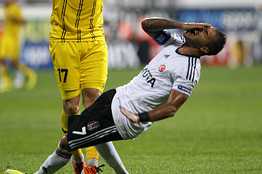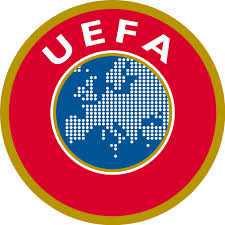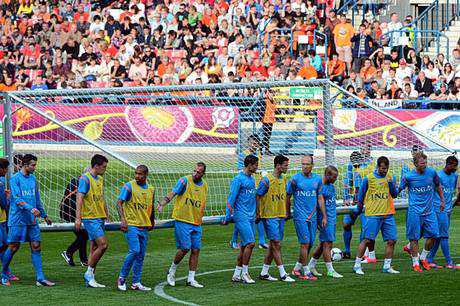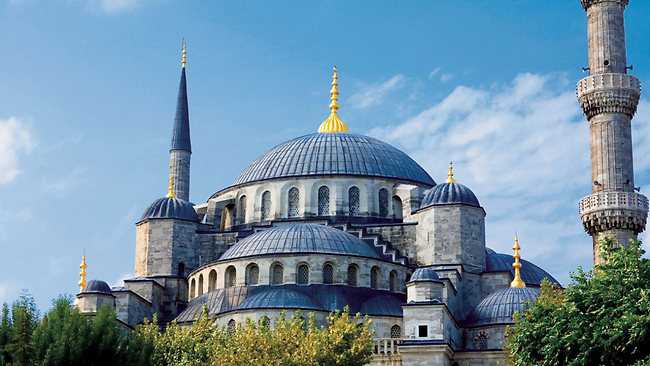By JOE PARKINSON
 ISTANBUL—Fiyapi Inonu Stadium on Thursday showcased the latest sign of the deteriorating diplomatic relationship between longtime allies Turkey and Israel: 12 Israeli soccer fans.
ISTANBUL—Fiyapi Inonu Stadium on Thursday showcased the latest sign of the deteriorating diplomatic relationship between longtime allies Turkey and Israel: 12 Israeli soccer fans.
Engulfed by a sea of empty white seats in the 32,000-capacity stadium and vastly outnumbered by battalions of riot police, the solitary Israelis had traveled to cheer their team, Maccabi Tel Aviv, against Istanbul’s Besiktas in a politically charged Europa league match.
Ricardo Quaresma of Besiktas reacted as he was stopped by Savo Pavicevic of Maccabi Tel Aviv during their match.
When the tournament schedule was announced, Istanbul authorities had expected thousands of Israeli supporters to attend, but just a dozen made it there amid rapidly escalating tensions between Ankara and Jerusalem and fears of violence.
Israeli fans were shepherded into the visitors’ stand at the far end of the stadium, which is covered by a special fireproof netting to shield spectators from projectiles.
“I’ve been to games between Israeli and Turkish teams many times and we usually see hundreds or thousands of visiting fans,” said Joseph Perez-Ari, a commentator for Tel Aviv Radio broadcasting at the stadium. “Today there’s so few. It’s because people are scared, because of the situation.”
Late Thursday, the match appeared to have passed largely without incident as Besiktas, the pre-game favorites, romped to a 5-1 victory.
But the dramatically increased police presence and sporadic protests by anti-Israeli demonstrators in the center of the city underscored that the relationship between the countries is being redefined.
Tensions escalated after Israel refused to apologize for a raid on a Gaza-bound ship last year that killed nine activists, prompting Turkey to expel top Israeli diplomats, cut military ties with the country and vow to send navy vessels to escort aid ships in the future.
That coincided with Turkey showing signs of trading its vaunted “zero problems with neighbors” foreign policy for a more muscular approach, bidding to become the leading power in the Middle East and North Africa. The shift, on display as Prime Minister Recep Tayyip Erdogan approved a major aerial bombing campaign against Kurdish rebels in northern Iraq and pressed Egypt to let him visit Hamas-run Gaza, could trigger clashes with Jerusalem and force Washington to choose between its closest allies in the region, analysts said.
At Thursday’s match, fans said Besiktas’s on-field domination may have diminished the potential for violence, which could have further fueled tensions.
Still, Thursday saw an escalation of diplomatic tensions in the eastern Mediterranean.
Turkey’s foreign ministry warned that it would sign a continental-shelf delimitation agreement with Turkish-backed Northern Cyprus if the Greeks of the divided island move ahead, following a December maritime-demarcation deal with Israel, to develop offshore natural-gas fields.
Athens responded by calling on Turkey to drop threats to Cyprus, warning the dispute could prove “dangerous” to the already tense eastern Mediterranean basin.
In Tunis, Prime Minister Erdogan, following a meeting with his Tunisian counterpart Beji Caid Essebsi, reiterated that Turkish warships would be deployed in the Mediterranean, stressing that Israel would “no longer be able to do what it wants” in those waters.
The buildup to Thursday’s match also reflected heightened diplomatic tension.
Before the evening kickoff, several hundred protesters gathered in Istanbul’s landmark Taxim Square, chanting anti-Israel and anti-American slogans and briefly halting traffic at one on the city’s busiest intersections.
The Israeli team arrived at Istanbul’s Ataturk Airport on Wednesday under tight security and were escorted from the stadium by riot police after the match.
Istanbul police tried to calm fears, stressing that they had taken measures to thwart protests that were organized on social-networking websites, including possible plans to invade the pitch.
Amid fears over their citizen’s security, Israeli authorities had petitioned UEFA, European soccer’s governing body, to reschedule the game at a neutral venue, but Turkey’s government refused, last week offering guarantees for players’ and fans’ safety.
Turkish Sports Minister Suat Kilic told reporters at a televised news conference last week that “various issues” existed between Turkey and Israel, “but it is not a situation that could prevent this match. “The game would be played in the “highest level of [Turkish] hospitality,” and that Israeli players would “safely” return home, he added.
Write to Joe Parkinson at [email protected]
via Turkey Beats Israel in Politically Charged Soccer Match – WSJ.com.
 LAUSANNE: According to Star, Polish top-flight club Legia Warsaw were on Wednesday ordered by UEFA to shut a stand used by its die-hard fans after racist chanting by supporters at a Champions League match.
LAUSANNE: According to Star, Polish top-flight club Legia Warsaw were on Wednesday ordered by UEFA to shut a stand used by its die-hard fans after racist chanting by supporters at a Champions League match.




